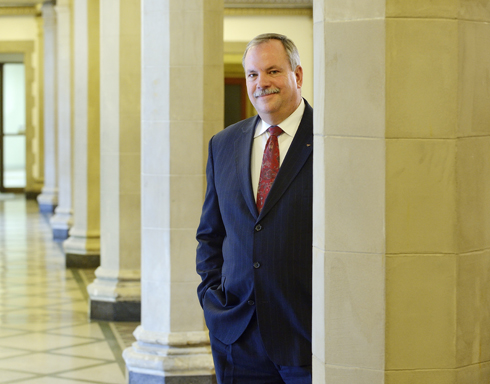Virginia Tech becomes first university to be certified by Virginia Values Veterans

Virginia Tech has become the first public university to be certified for its commitment to hire veterans. As the number of veterans returning home from Iraq and Afghanistan and into the workforce has increased in recent years, Virginia Tech has expanded its efforts to help veterans find employment at the university.
Recognition of these efforts has come most recently in the form of a certification from the Virginia Values Veterans (V3) program run by the Virginia Department of Veterans Services to help companies hire and retain military veterans.
“As the largest employer in the region, Virginia Tech’s involvement in the program sets a great example to small businesses around the commonwealth,” said Andy Corbett a program analyst with Virginia Values Veterans. “Virginia Tech has done more than make a commitment to hire veterans, the university has preserved future generations of warfighters.”
In 2011, about 47,000 people applied for jobs at the university. About 1,700 of them indicated they are veterans. As of fall 2012, Virginia Tech employed about 300 veterans. As part of the certification process, the university has committed that at least 5 percent of all new hires in 2013 will be veterans.
There are currently 53 certified organizations across the state; however, Virginia Tech is the first university to become certified.
“Our military men and women serve our country and face an uncertain employment future when they leave the military,” said Hal Irvin, associate vice president of Human Resources. “Our veterans learn commitment, discipline, and professionalism through their service and make wonderful employees. Virginia Tech supports the hiring of veterans because, as an employer, we benefit from their skills, experience, and work ethic”
Veterans as employees
In 2010, the Department of Human Resources established its Vet-to-Vet program after Director of Staffing and Recruiting Curtis Mabry and Staffing and Recruiting Specialist Christy Lowe noticed that the majority of the veterans who were applying for jobs on campus didn’t make the first round of cuts as a result of the difficulty translating military job experience into civilian job experience and skills.
Veterans in the program receive one-on-one assistance identifying an area at the university in which they would like to work, developing a resume, and navigating the application process. Through the program, the veterans receive assistance identifying strengths and weaknesses in their skill sets and find ways to become more competitive in the job market.
Virginia Tech enjoys a great working relationship with the local Veteran representatives at the Radford, Roanoke, and Wytheville Virginia Employment Commission offices. Lowe meets on a regular basis with the Veteran Reps to develop a pipeline of veteran applicants for Virginia Tech.
Throughout the year, Mabry and his team attend dozens of job fairs across the country. In May, Mabry spent several days meeting with officials at the Norfolk Naval Base in Norfolk, Va., where he spoke with U.S. Navy officials about how to get Virginia Tech job information in front of active duty service men and women who are transitioning out of the service.
A committee of representatives from across the university has also come together recently to begin looking at ways to improve veteran recruiting and outreach, as well as develop training and recognition programs.
In August, Virginia Tech will be hosting a Virginia Values Veterans conference at The Inn at Virginia Tech.
Dedicated to its motto, Ut Prosim (That I May Serve), Virginia Tech takes a hands-on, engaging approach to education, preparing scholars to be leaders in their fields and communities. As the commonwealth’s most comprehensive university and its leading research institution, Virginia Tech offers 240 undergraduate and graduate degree programs to more than 31,000 students and manages a research portfolio of $513 million. The university fulfills its land-grant mission of transforming knowledge to practice through technological leadership and by fueling economic growth and job creation locally, regionally, and across Virginia.







